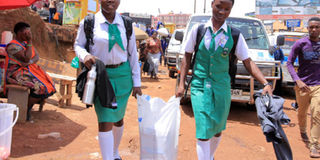Teachers told to counsel students as schools reopen

Back home. Students at the Old Taxi Park in Kampala after schools closed on March 19, 2020. PHOTO BY DAVID LUBOWA
What you need to know:
- Mr Alex Craig Kiwanuka, an official from Reproductive Health Uganda said such sexuality challenges would have been minimised if the School Health Policy had been passed.
Teachers have been encouraged to offer psychosocial support to the learners who are reporting back to schools after seven months of being at home due to Covid-19 induced lockdown.
Mr Henry Semakula, the Senior Education Officer, Guidance and Counselling/ Assistant Coordinator Health- HIV unit at the education ministry, reasoned that some of the learners were subjected to sexual abuse and domestic violence and that they may not be in their right minds to study.
"As the ministry of education, we have been moving around inspecting schools to see whether they are prepared for reopening or not. In the process of the inspection, we have been urging teachers to offer psychosocial support to the learners too and not only pumping them with reading materials to compensate for the lost time," Mr Semakula appealed to teachers on Friday.
"This is because a teacher could be busy teaching and yet a student is thinking of how she survived or how she was raped by her uncle but not grasping whatever is being taught," he added.
Mr Semakula was speaking at a half-day workshop for young people organised by Youth Alliance For Family Planing and Adolescent Health (UYAFPAH) in Kampala.
In March this year, President Museveni, announced the closure of all education institutions as a precaution against contracting the deadly Covid-19 virus.
However, the President recently, as a way of relaxing the lockdown, announced the re-opening of schools for candidate classes and finalists in universities and other institutions of higher learning that resumed on October 15, 2020.
An estimate of 1.2m learners are expected to return to school.
Mr Semakula further said in the past, teachers were blamed for impregnating their female students and yet more female students have got pregnant while at home in the hands of their parents and guardians.
Statistics from police corroborate Semakula’s assertion given that over 21,000 cases of violence against children were registered in the period of the lockdown between March and July.
Most of them were sexually abused during the long Covid-19 lockdown with a big number of them getting pregnant.
However, the ministry of education, recently came out and ordered school administrators not to send away learners who will be reporting while pregnant.
The government policy before Covid-19 outbreak, only allowed pregnant learners to resume with their studies after giving birth and schools could turn away any learner who were discovered pregnant while at school.
Mr Alex Craig Kiwanuka, an official from Reproductive Health Uganda said such sexuality challenges would have been minimised if the School Health Policy had been passed.
The policy has been on the shelves for close to two decades now.
Once passed, the policy is expected to make it possible for every learner to access relevant health services, information, knowledge and skills that are appropriate for their age, gender, culture, language and context, among others.
The policy also once passed will also provide for guidelines on how to manage cases of pregnant school girls, address issues of menstrual health, mental health and obesity in schools.




